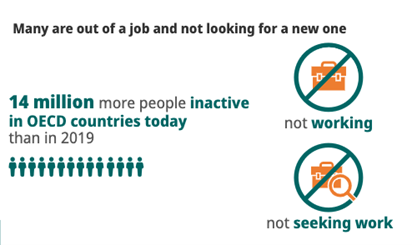

Executive Director
Global Apprenticeship Network (GAN)
There is no doubt that Covid transformed the Future of Work, providing Africa an opportunity to reshape traditional concepts of work. Two years since the onset of the pandemic, many employers are facing new challenges in 2022 to restructure their workforces.
In the developed world, record numbers of people are leaving their jobs in what is now known as the Great Resignation, and employers are grappling with a plethora of new challenges. Although the Great Resignation was originally coined as an American phenomenon, its effects. According to the Organisation for Economic Co-operation and Development (OECD), there are about 20 million fewer jobs across its 38 member countries than before the pandemic, while 14 million of these countries’ unemployed are not looking for work.

For Africa, the post-Covid world presents an opportunity to reshape some of the traditional concepts and notions of work. Questions include: How can a mix of in-person and remote work be synchronised? How can new talent be trained and those who are still employed be up- or re-skilled? How can training programmes be leveraged to retain employees while ensuring a meaningful and inclusive Future of Work that meets the unique challenges facing African youth, informal workers, marginalised communities, vulnerable workers and those seeking to plug into the opportunities for innovation?
The chance for reflection also extends to education and training systems and approaches to workforce development. Since its founding in 2014, the Global Apprenticeship Network (GAN) has widened its scope to focus not only on apprenticeships for youth, but also on adapting work-based learning (WBL) programmes for all. This shift in strategy followed the realisation that companies and policy makers cannot continue with traditional training models but instead can use the changing times to reconfigure models for training.
Training programmes need to become agile and adaptable for the range of emerging technologies, job categories and evolving skills that the world will need in the near future. The need for agility and adaptability prompted the Skills Initiative for Africa (SIFA) to develop a handbook on demand-driven partnerships in vocational education, available through a download on the ASPYEE website. The website includes many resources for WBL, such as a February 2021 workshop on strengthening the involvement of SMMEs in WBL.
In the context of the Future of Work, WBL, including apprenticeships and internships, can be a way to empower workers of all ages to acquire skills needed throughout their entire career cycle. Set against the backdrop of the Covid impact on global labour markets, a wide array of WBL, including upskilling, reskilling and new skilling initiatives, can adapt workforces to the massive changes needed to respond to the rapidly changing world of work. The renewed focus on skilling is complemented by the focus on empowerment and equal opportunities through the recognition of diversity, equity and inclusion (DEI) strategies that many organisations are implementing.
Collaborations with leading public-private platforms, including GAN Global, the G20, B20, ILO as well as examples at regional and country level, have prioritised designing a global recovery that is centred on sustainable and inclusive growth, while ensuring innovation, responsiveness and agility. Furthermore, there is an urgent need to implement strategies and solutions that are delivered in a meaningful and targeted way, allowing the full participation of women, youth and other marginalised groups in business and society.
There is an urgent need to co-create enabling environments through collaboration that centres on an openness to different learning pathways as well as the recognition that current systems need to be updated to respond to current and future labour market transitions. An agile, flexible workforce that is mobile and adaptable through turbulent times, while still ensuring access to decent work opportunities, stable income and ongoing upskilling and reskilling, is clearly needed.
GAN Global's membership base is of companies considered as top employers because of their training cultures that are ingrained throughout the learning cycles of employees. In partnership with the private sector, we also work with members representing leading policy development agencies as well as government partners. This model of collaboration serves to demonstrate the value of a convening platform from which strategies can be designed and developed and best practices shared.
This approach, coupled with our focus on influencing an adaptive and responsive policy environment is central to our agenda of strengthening the impact of work-based learning in the public and private sector. This is demonstrated through increased pathways into the labour market and improvement in employment rates. Skills development becomes a priority for public and private sector partners when policy and practice are aligned to labour market needs - a productive circle of positive socio-economic impact that can be adapted and applied to local need and context.


